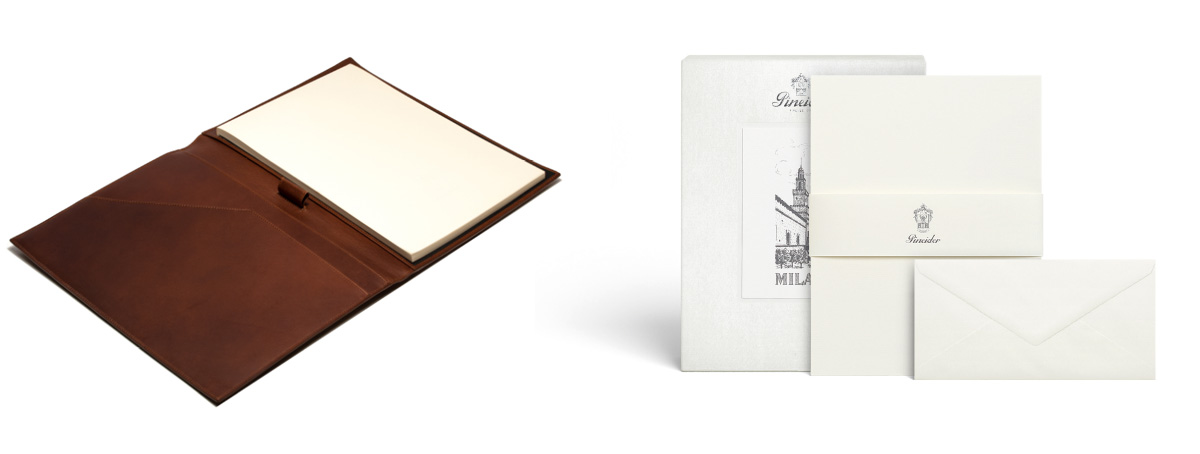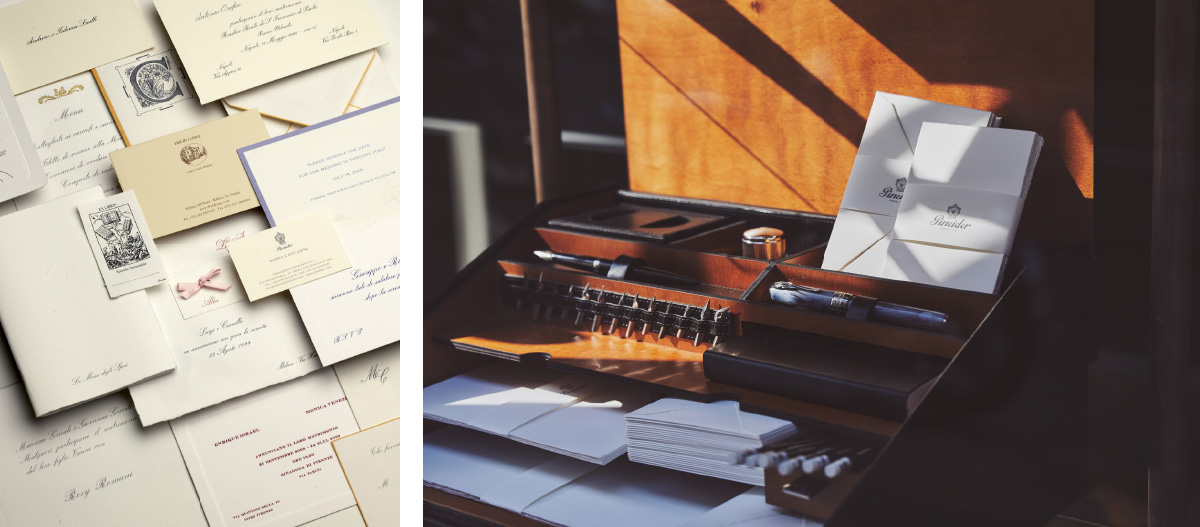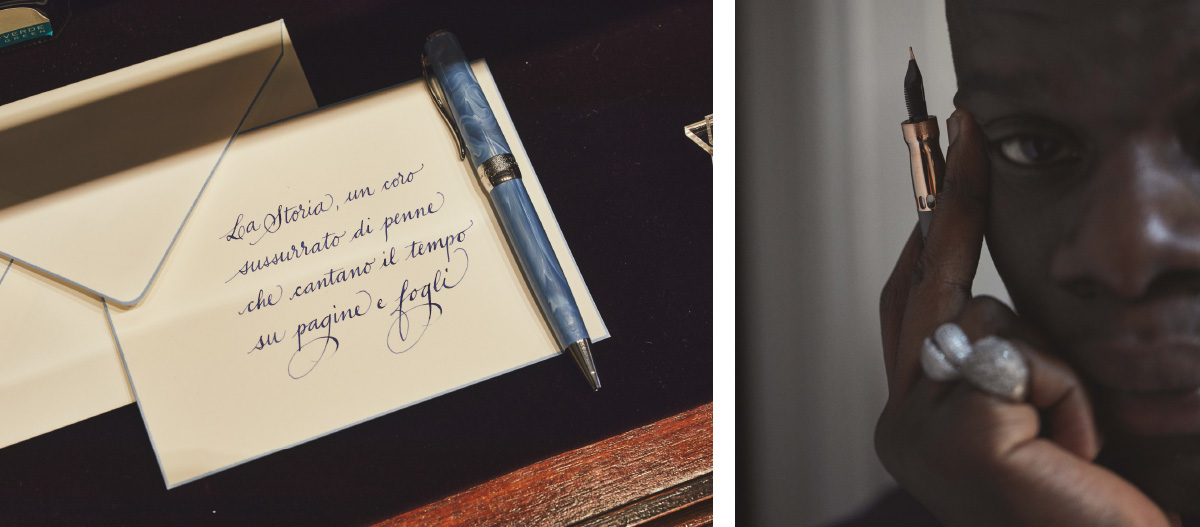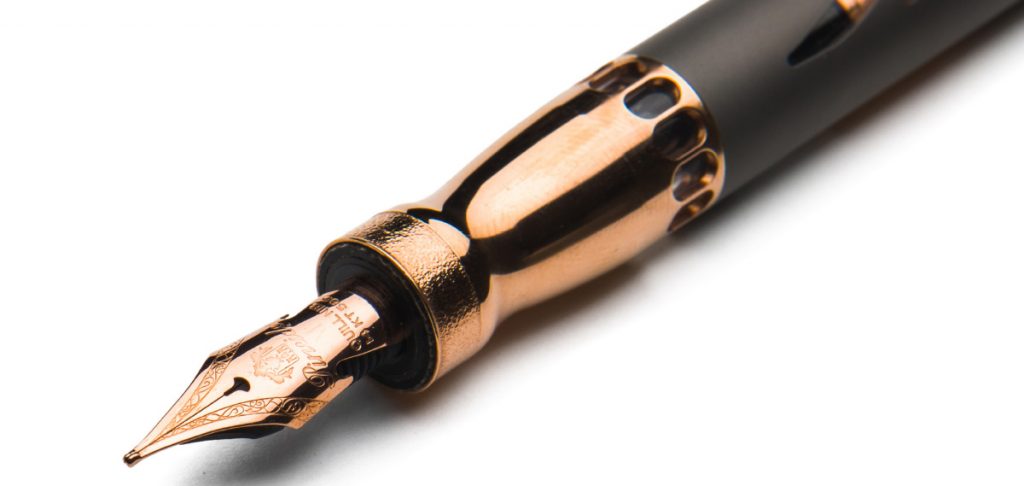Through its manifesto, Pineider shows how time can be sung by a chorus of whispering pens, on reams of luxurious paper.
The space we dedicate to handwriting in our everyday lives has increased enormously during the course of this strange pandemic, bringing us back somehow to our origins through the use of pen and paper.
Even among digital natives for whom technology is now the consolidated norm, with the gradual erosion of motor skills and visual-motor memory and the implicit consequences this has on creative capacity, we’re seeing an increased awareness of the need to safeguard access to this creative gesture, and encourage the good practise of handwriting.
We’re going back, looking for the beautiful fountain pens we used in our schooldays, and rediscovering special qualities of papers and intimate moments of communion with the rules of beauty and harmony governing the form of the letters.
Writing is good, helps the memory, relaxes and trains both hand and mind and gives us the chance to leave a unique sign of our existence here on this earth.

Over these months of isolation we’ve reacquainted ourselves with writing as an art form worthy of saving, and gone looking for a company currently undergoing a radical reorganisation of its entire structure to create a new line in fine pens, paper and leather.
We’re talking about Pineider, the historic workshop established in Florence at the behest of Francesco Pineider in 1774 and ever since synonymous with exclusivity and craftsmanship in paper, leather goods and writing instruments, now back in the spotlight after being acquired by the Rovagnati family.
Three years of investments in business organisation, communication and design have gone into developing a powerhouse of experience and ideas, bringing together retail, wholesale and marketing in an all-encompassing vision of the world of bespoke stationery and luxury writing instruments, to rekindle the deep bonds between the brand and its customers.
Guiding the changes, director general Giuseppe Rossi, along with Matteo Maresi and Anna Costabile, both part of his team. We spoke long with them about the comeback calligraphy is making, and the enormous creative potential contained in the act of leaving an intelligible mark on a sheet of paper. “If I hadn’t studied International Economics I would have studied geology so I could work in prospecting for minerals or oil or something” explains Giuseppe Rossi, “while in reality the only thing that really interested me as a child was the idea of travel, I read adventure books a lot which led me to write and dream. But as you can see, half of my dreams have come true through my work in fashion and design that’s allowed me to travel all over the world”.

When he took the reins of Pineider in March 2017 he also took on a mission, a professional challenge to give new voice to the ancient art of writing, so rich in values and traditions it would be such a crime to lose.
An ongoing project that’s beginning to bear fruit. “A success dictated above all by the passion of our shareholders” assures Giuseppe Rossi “and the methodical research of our workgroup in rediscovering the values of Pineider, not to mention the talent of our designers who’ve done a great job reinterpreting the significance of excellence in personalised writing paper, calling cards and wedding invitations accompanying our pens, watches and leather items”.
Always a truly top-end brand, the customers of Pineider’s celebrated letter paper included many illustrious names, from Eleonora Duse, Maria Callas, Gabriele D’Annunzio and Luigi Pirandello, to Henry Ford, Marlene Dietrich, Rudolf Nureiev, Luchino Visconti and Elizabeth Taylor who – so the story goes – ordered a certain kind of watermarked paper in the violet hue of her incredible eyes.
Another value the company puts great emphasis on is communication, and the two fundamental concepts expressed by the words consistence and solidity, both of which play a key role in the world of writing instruments and calligraphy. As Matteo Maresi, Pineider’s MKT explains, “Consistence and solidity, in writing understood as calligraphy, go hand in hand. The former has to do with the syntax, and the latter the lexicon. Although it immediately catches the eye, the calligraphy shouldn’t distract from the text, but entice the reader into it. When calligraphic, a consistent, solid manuscript has a structure that while simple is rich in detail, filled with clear, defined and not vaporous words, capable of drawing the reader into the content, the plot”, adding “consistent, solid writing doesn’t create the ellipsis, but clearly delineates every sense expressed in it”. Just a thought, which maybe gives us a better insight into the character of writing on paper and the reason for its return to popularity in this digital age, “because every one of us has a desire to express free, irreducible thoughts” concludes Matteo Maresi “without the sadness of knowing they’re destined to become lost in the immense flows of “big data”.

This is perhaps another positive aspect of the lockdowns, which Anna Costabile, E-commerce Store Manager also confirms: “In these difficult times for everyone, I see immense introspective, pedagogical power in writing. It’s a means for approaching the most intimate parts of ourselves through the repetition of gestures and the silence it requires. It’s a tool for building one’s personal identity. A classic example of this is your personal diary”. So what new horizons are opening up for writing? “One full of wonderful surprises we’ll never abandon for the intangible, fleeting nature of the digital” concludes Anna Costabile “One big surprise is that so many digital natives are rediscovering the art of writing and its potential thanks also to so many young artists in the Italian music scene, rap especially, who make particular use of the written word to express their ideas.”
A project inspired on the spirit of humanity that raises the interiority of each individual and gives the power to shape a personal future, coupled with an elegance that goes beyond fashion and convention, designed to make a statement.
Writing is magical, a magical gateway to the world hidden within us. The written word indeed has the power to fire the imagination, bring light to the dark and hope for a better future.

